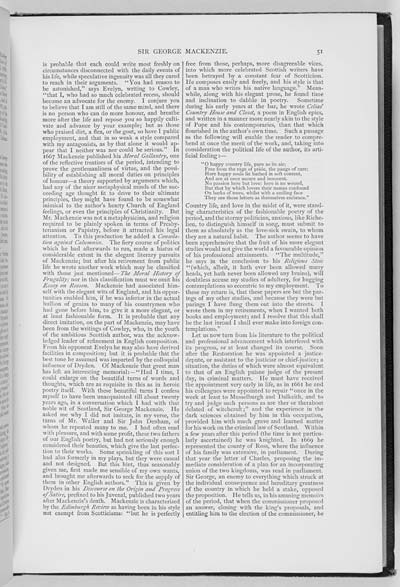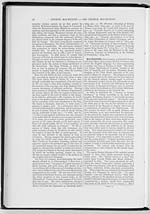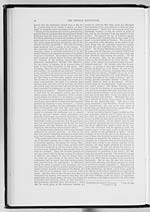51
is probable that each could write most freshly on
circumstances disconnected with the daily events of
his life, while speculative ingenuity was all they cared
to reach in their arguments. "You had reason to
be astonished," says Evelyn, writing to Cowley,
"that I, who had so much celebrated recess, should
become an advocate for the enemy. I conjure you
to believe that I am still of the same mind, and there
is no person who can do more honour, and breathe
more after the life and repose you so happily culti-
vate and advance by your example; but as those
who praised dirt, a flea, or the gout, so have I public
employment, and that in so weak a style compared
with my antagonists, as by that alone it would ap-
pear that I neither was nor could be serious." In
1667 Mackenzie published his Moral Gallantry, one
of the reflective treatises of the period, intending to
prove the gentlemanliness of virtue, and the possi-
bility of establishing all moral duties on principles
of honour�a theory supported by arguments which,
had any of the nicer metaphysical minds of the suc-
ceeding age thought fit to drive to their ultimate
principles, they might have found to be somewhat
inimical to the author's hearty Church of England
feelings, or even the principles of Christianity. But
Mr. Mackenzie was not a metaphysician, and religion
required to be plainly spoken in terms of Presby-
terianism or Papistry, before it attracted his legal
attention. To this production he added a Consola-
tion against Calumnies. The fiery course of politics
which he had afterwards to run, made a hiatus of
considerable extent in the elegant literary pursuits
of Mackenzie; but after his retirement from public
life he wrote another work which may be classified
with those just mentioned�The Moral History of
Frugality; nor in this classification must we omit his
Essay on Reason. Mackenzie had associated him-
self with the elegant wits of England, and his oppor-
tunities enabled him, if he was inferior in the actual
bullion of genius to many of his countrymen who
had gone before him, to give it a more elegant, or
at least fashionable form. It is probable that any
direct imitation, on the part of Mackenzie, may have
been from the writings of Cowley, who, in the youth
of the ambitious Scottish author, was the acknow-
ledged leader of refinement in English composition.
From his opponent Evelyn he may also have derived
facilities in composition; but it is probable that the
best tone he assumed was imparted by the colloquial
influence of Dryden. Of Mackenzie that great man
has left an interesting memorial:�"Had I time, I
could enlarge on the beautiful turns of words and
thoughts, which are as requisite in this as in heroic
poetry itself. With these beautiful turns I confess
myself to have been unacquainted till about twenty
years ago, in a conversation which I had with that
noble wit of Scotland, Sir George Mackenzie. He
asked me why I did not imitate, in my verse, the
turns of Mr. Waller and Sir John Denham, of
whom he repeated many to me. I had often read
with pleasure, and with some profit, these two fathers
of our English poetry, but had not seriously enough
considered their beauties, which give the last perfec-
tion to their works. Some sprinkling of this sort I
had also formerly in my plays, but they were casual
and not designed. But this hint, thus seasonably
given me, first made me sensible of my own wants,
and brought me afterwards to seek for the supply of
them in other English authors." This is given by
Dryden in his Discourse on the Origin and Progress
of Satire, prefixed to his Juvenal, published two years
after Mackenzie's death. Mackenzie is characterized
by the Edinburgh Review as having been in his style
not exempt from Scotticisms: "but he is perfectly
free from those, perhaps, more disagreeable vices,
into which more celebrated Scottish writers have
been betrayed by a constant fear of Scotticism.
He composes easily and freely, and his style is that
of a man who writes his native language." Mean-
while, along with his elegant prose, he found time
and inclination to dabble in poetry. Sometime
during his early years at the bar, he wrote Celias'
Country House and Closet, a poem in English epics,
and written in a manner more nearly akin to the style
of Pope and his contemporaries, than that which
flourished in the author's own time. Such a passage
as the following will enable the reader to compre-
hend at once the merit of the work, and, taking into
consideration the political life of the author, its arti-
ficial feeling:�
"O happy country life, pure as its air;
Free from the rage of pride, the pangs of care;
Here happy souls lie bathed in soft content,
And are at once secure and innocent.
No passion here but love: here is no wound,
But that by which lovers their names confound
On barks of trees, whilst with a smiling face
They see those letters as themselves embrace."
Country life, and love in the midst of it, were stand-
ing characteristics of the fashionable poetry of the
period, and the stormy politician, anxious, like Riche-
lieu, to distinguish himself in song, must submit to
them as absolutely as the love-sick swain, to whom
they are a natural habit. The author seems to have
been apprehensive that the fruit of his more elegant
studies would not give the world a favourable opinion
of his professional attainments. "The multitude,"
he says in the conclusion to his Religious Stoic
"(which, albeit, it hath ever been allowed many
heads, yet hath never been allowed any brains), will
doubtless accuse my studies of adultery, for hugging
contemplations so eccentric to my employment. To
these my return is, that these papers are but the par-
ings of my other studies, and because they were but
parings I have flung them out into the streets. I
wrote them in my retirements, when I wanted both
books and employment; and I resolve that this shall
be the last inroad I shall ever make into foreign con-
templations."
Let us now turn from his literature to the political
and professional advancement which interfered with
its progress, or at least changed its course. Soon
after the Restoration he was appointed a justice-
depute, or assistant to the justiciar or chief-justice; a
situation, the duties of which were almost equivalent
to that of an English puisne judge of the present
day, in criminal matters. He must have received
the appointment very early in life, as in 1661 he and
his colleagues were appointed to repair "once in the
week at least to Musselburgh and Dalkeith, and to
try and judge such persons as are ther or therabout
delated of witchcraft ;" and the experience in the
dark sciences obtained by him in this occupation,
provided him with much grave and learned matter
for his work on the criminal law of Scotland. Within
a few years after this period (the time is not particu-
larly ascertained) he was knighted. In 1669 he
represented the county of Ross, where the influence
of his family was extensive, in parliament. During
that year the letter of Charles, proposing the im-
mediate consideration of a plan for an incorporating
union of the two kingdoms, was read in parliament.
Sir George, an enemy to everything which struck at
the individual consequence and hereditary greatness
of the country in which he held a stake, opposed
the proposition. He tells us, in his amusing memoirs
of the period, that when the commissioner proposed
an answer, closing with the king's proposals, and
entitling him to the election of the commissioner, he

![]() Universal Viewer |
Universal Viewer | ![]() Mirador |
Large image | Transcription
Mirador |
Large image | Transcription
![]()

